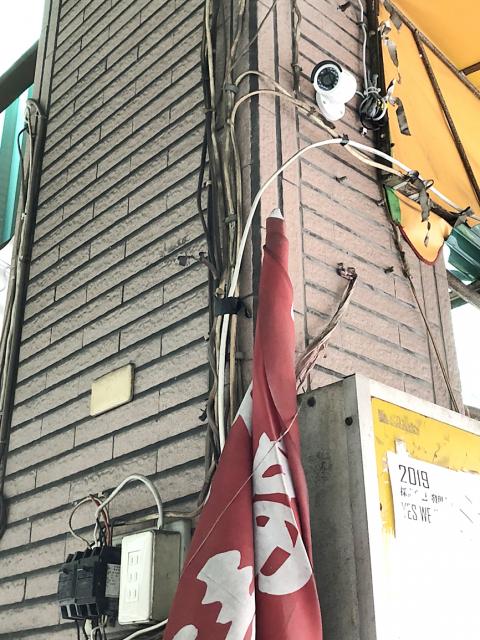Kaohsiung City Government-issued security cameras for city councilors were made by a Chinese company banned by the Executive Yuan as a cybersecurity risk, New Power Party (NPP) Kaohsiung City Councilor Huang Jie (黃捷) said yesterday.
Hangzhou Hikvision Digital Technology Co is one of the Chinese technology companies whose products the Executive Yuan blacklisted last year, but the Beijing-backed company has supplied cameras to the council as part of a municipal contract, Huang said.
Huang’s remarks came a day after Democratic Progressive Party (DPP) Taichung city councilors Chiang Chao-kuo (江肇國) and Huang Shou-ta (黃守達) said that Hikvision also made many of the security cameras installed in underpasses in Taichung.

Photo copied by Ko Yu-hao, Taipei Times
Huang Jie said she raised the issue with DPP Councilor Lin Yu-kai (林于凱) at a council session this year, but to no avail.
Hikvision cameras were awarded numerous contracts prior to the ban due to their low cost, she said.
However, Washington has moved to ban the company’s products from next month, with the US National Defense Authorization Act citing security reasons, she said.
DPP Kaohsiung City Councilor Chen Chih-chung (陳致中) said that four security cameras issued by the city and installed at his district office are Hikvision products.
The firm’s products are reportedly used by Beijing to monitor Muslim minorities at camps in China’s Xinjiang region.
The cameras in the district office could have given Chinese officials complete access to his activities, Chen said, adding: “The spread of ‘red’ surveillance is a danger to the right to privacy of Taiwanese and national security at every level.”
Kaohsiung Mayor Han Kuo-yu (韓國瑜) said that the city has no knowledge of owning Hikvision surveillance devices.
However, a Kaohsiung City Council official said that it had bought Chinese cameras before the Executive Yuan issued the ban, adding that the council would comply if the central government orders their removal.
The Taichung Construction Bureau said that Chinese-made security cameras would be removed from city underpasses.
The Taichung City Government is in the process of verifying the maker of its security cameras and 136 Hikvision units have been found so far, the bureau said, adding that one vehicle and nine pedestrian underpasses have been inspected, with 10 remaining.
Contractors that sold Hikvision cameras to Taichung are expected to supply replacements to the city free of charge, the bureau said, adding that it aims to phase out the blacklisted devices within a week.
The city did not realize banned cameras were used, because the contract delivery assessment process only checked the cameras for function, not place of manufacture, the bureau said.
Orders for Taiwan-made security cameras have soared after reports about Hikvision emerged, an industry insider said on condition of anonymity.
Requests to replace security cameras came mostly from high-income households, the source said, adding that one client placed an order for 30 cameras.
Requests to replace security cameras came mostly from people who live in mansions, but also some who use Hikvision cameras at their factories, the source said.
“The client is in the manufacturing sector and owns factories in Taiwan and China, so they are worried about personal privacy and the proprietary technologies of their business,” they said.
Using Chinese security cameras or surveillance systems has inherent risks, as Chinese companies are known to install backdoors in firmware, allowing third-party access to information on connected devices, the source said.
The Taiwanese security technology sector needs to develop facial recognition and biometric algorithms to remain competitive with China, they said.
Additional reporting by Huang Chung-shan and Hsu Kuo-chen

The Mainland Affairs Council (MAC) today condemned the Chinese Communist Party (CCP) after the Czech officials confirmed that Chinese agents had surveilled Vice President Hsiao Bi-khim (蕭美琴) during her visit to Prague in March last year. Czech Military Intelligence director Petr Bartovsky yesterday said that Chinese operatives had attempted to create the conditions to carry out a demonstrative incident involving Hsiao, going as far as to plan a collision with her car. Hsiao was vice president-elect at the time. The MAC said that it has requested an explanation and demanded a public apology from Beijing. The CCP has repeatedly ignored the desires

Many Chinese spouses required to submit proof of having renounced their Chinese household registration have either completed the process or provided affidavits ahead of the June 30 deadline, the Mainland Affairs Council (MAC) said on Thursday. Of the 12,146 people required to submit the proof, 5,534 had done so as of Wednesday, MAC deputy head and spokesperson Liang Wen-chieh (梁文傑) said. Another 2,572 people who met conditions for exemption or deferral from submitting proof of deregistration — such as those with serious illnesses or injuries — have submitted affidavits instead, he said. “As long as individuals are willing to cooperate with the legal

The Ma-anshan Nuclear Power Plant’s license has expired and it cannot simply be restarted, the Executive Yuan said today, ahead of national debates on the nuclear power referendum. The No. 2 reactor at the Ma-anshan Nuclear Power Plant in Pingtung County was disconnected from the nation’s power grid and completely shut down on May 17, the day its license expired. The government would prioritize people’s safety and conduct necessary evaluations and checks if there is a need to extend the service life of the reactor, Executive Yuan spokeswoman Michelle Lee (李慧芝) told a news conference. Lee said that the referendum would read: “Do

The Ministry of Environment yesterday held a seminar in Taipei for experts from Taiwan and Japan to exchange their experiences on the designs and development of public toilets. Japan Toilet Association chairman Kohei Yamamoto said that he was impressed with the eco-toilet set up at Daan Forest Park, adding that Japan still faces issues regarding public restrooms despite the progress it made over the past decades. For example, an all-gender toilet was set up in Kabukicho in Tokyo’s Shinjuku District several years ago, but it caused a public backlash and was rebuilt into traditional men’s and women’s toilets, he said. Japan Toilet Association